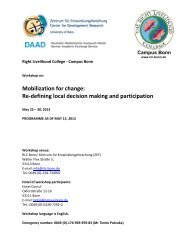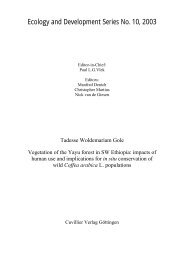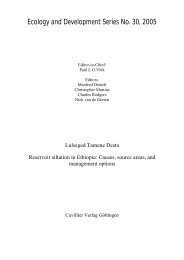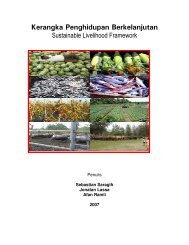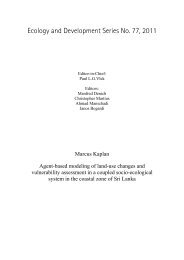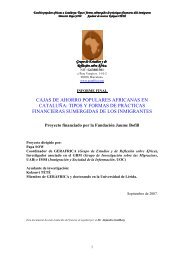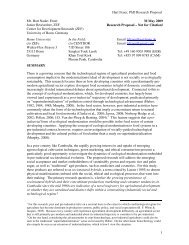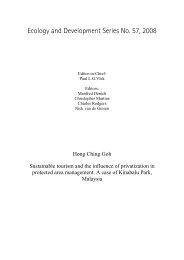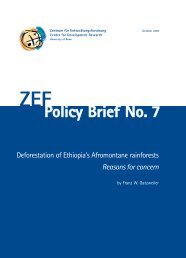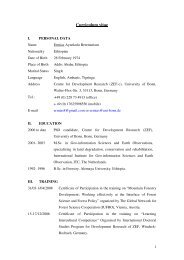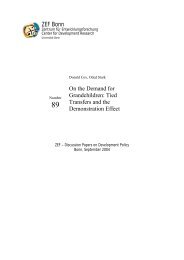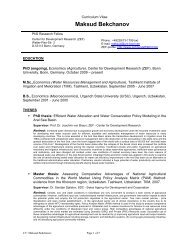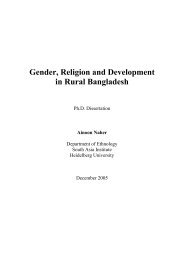Karuna Trust, Karnataka - ZEF
Karuna Trust, Karnataka - ZEF
Karuna Trust, Karnataka - ZEF
You also want an ePaper? Increase the reach of your titles
YUMPU automatically turns print PDFs into web optimized ePapers that Google loves.
Good and Bad Practices in Microinsurance<strong>Karuna</strong> <strong>Trust</strong>, Indiasituation for patients. An emphasis is set on the training medical officers and healthworkers in diagnosing and treating mental diseases.• Community-based eye care program strives to prevent blindness by supplying VitaminA, especially to children. Another main focus is on the early diagnosis of cataracts andthe support of patients who undergo a cataract surgery. Multipurpose workers andmedical officers also develop their knowledge to treat eye infection and injuries.• Dental health is neglected in some rural regions, but it is an important health concern.<strong>Karuna</strong> <strong>Trust</strong> operates a fully equipped mobile dental health unit. At fixed times it makesdental care available at primary health centres. Furthermore, dental checkups forschoolchildren are conducted and health workers are trained in dental health.• An Herbal Medicine Production Unit encourages villagers to grow herbs. Some self-helpgroups have started to plant ‘Adotoda Vasaka’ and other herbs. In Mysore, a trainingcentre with an herbal garden was opened in July 2005.• The <strong>Trust</strong> also runs 18 Primary Health Centres in 16 taluka on behalf of thegovernment. The State Government seems to be quite satisfied with the <strong>Trust</strong>’smanagement. Further Primary Health Centres are handed over to <strong>Karuna</strong>.<strong>Karuna</strong> <strong>Trust</strong> expanded its work to T. Narsipur Taluk in 1996 in collaboration with Dr.Nagaraju Family Charitable <strong>Trust</strong>. The health and community-based rehabilitationprogramme are part of broad socio-economic activities. Sustainable agriculture, low-costhousing, social forestry, tribal cooperatives and promotion of appropriate technology, schooladoption, economic and human resource development programmes are further activities thatpoint out the wide variety of <strong>Karuna</strong> <strong>Trust</strong>’s initiatives.Box 2.1 Dr. Hannumappa Reddy SudarshanDr. H. Sudarshan was born in 1950 in Bangalore and graduated as a doctor in 1973 from BangaloreMedical College. He decided not to practice in a lucrative urban area, but to dedicate his life to socialdevelopment of poor communities. In 1979, he started to work with the Soliga tribe that has lived forcenturies in the B.R. Hills of <strong>Karnataka</strong> in harmony with nature. Deforestation for industrial purposesdeprived the tribe of their natural existence. Even governmental programmes to modernise villages in<strong>Karnataka</strong> did not benefit Soliga villages. When Dr. H. Sudarshan set up a clinic in 1979, he realisedthat the Soligas had no access to water, electricity, health care and schools.He founded VGKK in 1981 to provide development mechanisms to the Soligas. Within 20 years, thesituation of the Soligas’ has improved immensely. From being oppressed and unprivileged, the tribehas become empowered. They have a strong community now that protects their rights, enables themto participate and to become self-reliant and makes sure that their close relationship to nature andtraditions does not suffer.Among a variety of awards, Dr. H. Sudarshan received the Right Livelihood Award in 1994 “forshowing how tribal culture can contribute to a process that secures the basic rights and needs ofindigenous people and conserve their environment.”The Microinsurance OperationsIn collaboration, the Indian Ministry of Health and UNDP conducted studies across India onimproving the health status of the rural and poor population. One of the recommendations13



